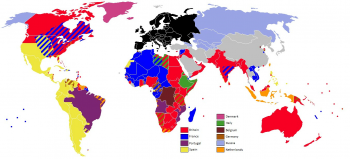Spiritual Israelite
Well-Known Member
That is unfortunately what it says in English translations, but you should consider that the Greek word has more meanings than just "nations" and you should consider what the original prophecy says that is being referenced in Revelation.I don't ignore the Hebrew. I simply understand it differently that you do. Whereas you think the rod breaks people, I think the rod breaks nations, which is what it says.
Psalm 2:7 I will declare the decree: the Lord hath said unto me, Thou art my Son; this day have I begotten thee. 8 Ask of me, and I shall give thee the heathen for thine inheritance, and the uttermost parts of the earth for thy possession. 9 Thou shalt break them with a rod of iron; thou shalt dash them in pieces like a potter's vessel.
Can you see here how the original prophecy indicates that it is "the heathen" that He will break with His rod of iron? It's not nations that He will destroy when He returns, it's individual unbelievers. Just like Paul indicates here:
2 Thess 1:7 And to you who are troubled rest with us, when the Lord Jesus shall be revealed from heaven with his mighty angels, 8 In flaming fire taking vengeance on them that know not God, and that obey not the gospel of our Lord Jesus Christ: 9 Who shall be punished with everlasting destruction from the presence of the Lord, and from the glory of his power;
This indicates that He will be taking vengeance on individuals who don't have a relationship with God and reject the gospel of Christ. Why would you not take passages like these into account when determining what it means for Him to rule with a rod of iron?
In Revelation 20:7-8, it talks about "nations" going up against "the camp of the saints" that number "as the sand of the sea". Clearly, it's not talking about a number of nations "as the sand of the sea". It's just an unfortunately poor translation of the Greek word "ethnos" there. It's obviously referring to individuals that number "as the sand of the sea", not nations. It's important to have some understanding of the original Hebrew and Greek words when studying scripture and there are plenty of Hebrew and Greek resources out there that can help us. Why not use them? What excuse do you have for not using them when they are easily accessible for free, such as blueletterbible.org?


